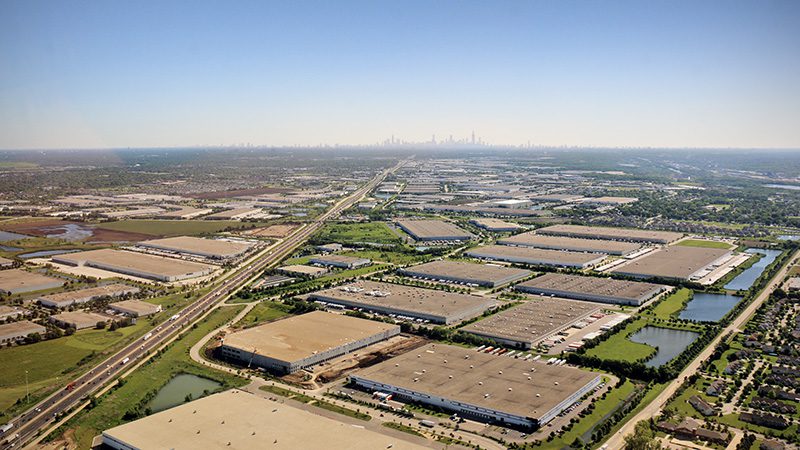May 2025
Trump’s Tariffs Could Offer Chicago’s Industrial Market a Reshoring Edge

From “Trump’s Tariffs Could Offer Chicago’s Industrial Market a Reshoring Edge” – BISNOW
After a turbulent month of tariff policy from the Trump administration, Chicago’s industrial market could emerge as a winner and score big nationally, according to new reports.
The region’s central location, infrastructure and energy access position it well to take advantage of increased momentum toward onshoring. A lack of new supply coming online soon — just 1.5M SF of new construction broke ground in Q1 — could also drive up rents for vacant space.
“The reshoring trend is more than a headline,” said Nick Schlanger, director of research services at NAI Hiffman. “It’s fundamentally reshaping industrial demand nationally and in Chicago. So we’re seeing manufacturers prioritize locations with reliable infrastructure, water and climate resilience, all of which position Chicago very well.”
Just before President Donald Trump announced sweeping tariffs on most countries in early April, the Chicago metro area saw companies sign major leases in the first quarter.
Flextronics, a multinational manufacturing company, signed a 335K SF lease at 1501 Harris Road in Libertyville. Uline went just across the Illinois border to southeast Wisconsin, which is still within the city’s metro area, to sign one new lease and two renewals totaling about 1.6M SF.
A recent special report on tariffs from Transwestern found that the advantages of onshoring due to increased tariffs are expected to favor regions with more business-friendly environments, like neighboring Wisconsin and Indiana. Portions of those states are within the Chicago industrial metro area.
Despite national trends, Schlanger said he has seen a slight pause in activity in the last month, though he doesn’t anticipate the Chicago market is heading toward a long-term standstill.
Companies are reevaluating their options and increasingly considering U.S. markets for manufacturing and logistics needs, he said.
“Large companies are looking to grow,” Schlanger said. “There is availability and development capability domestically. I just don’t know that a lot of these companies have the ability to just fully wait and see how the next three years play out.”
Vacancy in Chicago’s industrial market measured 5.9% during the first quarter, up slightly from 5.7% a year ago, according to NAI Hiffman. But a lack of new starts following a pandemic-induced industrial boom in the area could constrict the market in the next 12 to 24 months as investors deploy dry powder, Schlanger said.
New construction in Chicago has slowed to just 1.4% of the total inventory, and tariff-related higher costs will likely stall the initiation of new projects, keeping the delivery pipeline dry in the near term, according to Transwestern.
“If anything, if we’re not going to build more, then things are going to get tighter and you’re going to see more rent growth over time,” said Caitlin Ritter, Midwest regional research director at Transwestern.
Ritter said a key subsector of industrial to keep an eye on in the city is the manufacturing market. If investors begin buying up manufacturing buildings or leasing them with greater velocity, it will be a “huge change.” Supply chains will likely evolve unpredictably as a result of the tariffs, but Chicago stands to benefit no matter how they do.
“How these supply chains change will create winners and losers in ways we can’t really forecast, but I would see Chicago as playing a role in any of them, because we’re right in the middle of every single [mode of] transportation,” Ritter said.
Some stakeholders said activity will remain muted until federal trade policy stabilizes.
Generally speaking, policies have dramatically altered demand in a negative way, Colliers Vice Chair Mike Senner told Bisnow in a statement. Companies sourcing materials outside of the U.S. or that have a global footprint are mostly frozen due to the uncertainty.
Occupiers appear to be taking a wait-and-see approach as they evaluate potential long-term policy shifts, Senner wrote. Should more clarity emerge, he said it could influence supply chain strategies and affect warehouse and distribution space demand accordingly.
“If we have six months in a row with no material change in direction and weight of tariffs, investors and industrial producers will feel like, ‘OK, these are the rules,’ and will act accordingly,” said Hans Nordby, executive managing director of research at Transwestern. “We’re just so far from that now.
“One week of consistent government policy is not going to help people feel comfortable about making major industrial decisions.”
Senner said large-scale strategic shifts, such as changes to manufacturing footprints, are generally contingent on the permanence of regulatory or trade policy changes. They typically require significant time and capital to implement, and companies pursue them only when there is greater predictability in the operating environment.
Still, Schlanger foresees that happening in the coming months.
“While the industrial capital markets have slowed, we are going to see investors, especially some of these large players, deploy dry capital in the next 12 to 24 months,” Schlanger said. “Chicago really checks all the boxes that you would look for in a thriving industrial market.”
About NAI Hiffman:
NAI Hiffman is one of the largest independent commercial real estate services firms in the US, with a primary focus on metropolitan Chicago, and part of the NAI Global network. We provide institutional and private leasing, property management, tenant representation, capital markets, project services, research, and marketing services for owners and occupiers of commercial real estate. To meet our clients’ growing needs outside of our exclusive NAI Hiffman territory, we launched Hiffman National, our dedicated property solutions division, which provides property management, project services, and property accounting services across the country. NAI Hiffman | Hiffman National is an award winning company headquartered in suburban Chicago, with more than 275 employees strategically located throughout North America.
About Hiffman National:
Hiffman National is one of the US’s largest independent commercial real estate property management firms, providing institutional and private clients exceptional customized solutions for property management, project management, property accounting, lease administration, marketing, and research. The firm’s comprehensive property management platform and attentive approach to service contribute to successful life-long relationships and client satisfaction. As a nationally bestowed Top Workplace, and recognized CRE award winner, Hiffman National is headquartered in suburban Chicago, with more than 275 employees nationally and an additional six hub locations and 25 satellite offices across North America.


